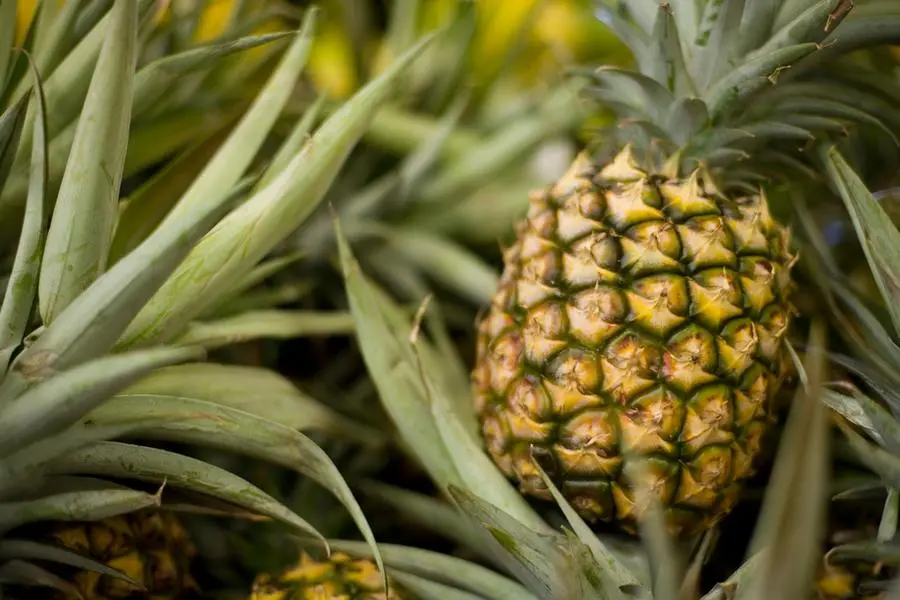PHOTO
Stakeholders in the agricultural sector on Monday expressed concerns over the capital flight caused by the importation of pineapples from Ghana and Togo into the country, resulting in a daily loss of N50 million.
Ambassador Oluwasegun Alabi, a seasoned agriculturist, disclosed this during a press briefing held in Abuja. He observed that Nigeria has failed to leverage its comparative advantage as the eighth-largest producer of pineapples in the world, with an estimated total of 1,607,200 metric tons per annum.
According to the Food and Agriculture Organization (FAO) Corporate Statistics database, Ghana ranks 13th with an estimated total of 678,079 metric tons, while Togo ranks 16th, producing an estimated total of 472,514 metric tons per annum.
“But it is surprising that Ghana and Togo produce less than what Nigeria produces annually, yet Nigeria still imports pineapples from these two countries because our production is 50% less than our consumption, making us largely dependent on imports.”
“A new discovery has unveiled the incredible versatility of pineapples, revealing that they can be used to produce a variety of items such as clothing, shoes, bags, disposable plates, spoons, and even biofuel, along with the well-known health benefits of pineapples. All these factors have significantly increased the demand for pineapples worldwide.
“With vast, fertile land, Nigeria has the potential not only to meet its domestic pineapple demand but also to become a leading global exporter. However, despite favorable climatic conditions, Nigeria has struggled to position itself as a key player in the international pineapple market.
“Instead, the country continues to import pineapples and related products, missing out on potential export revenue and global trade opportunities. Nigeria’s inability to capitalize on its pineapple production can be traced to several key challenges.”
Available data also indicate that pineapple is the 5th most consumed fruit in the world and holds a unique position as one of the luxury produce items in the global market. The demand for pineapples consistently exceeds supply, making it a highly lucrative crop.
Noting that Nigeria can only meet 50 percent of its annual pineapple needs, Ambassador Alabi disclosed that there is high demand for pineapples from Asian countries.
He lamented that the pineapples cultivated in Nigeria do not meet the required standards for industrial use because farmers have failed to comply with standard agricultural practices, resulting in subpar fruit quality, which makes them unsuitable for export and industrial use.
The Chief Executive Officer of Davidorlah Farms maintained that without proper processing facilities to package pineapples, Nigerians cannot export value-added products such as canned pineapples and pineapple concentrate juice, thereby leaving the country out of the global market.
He further noted that despite the growing global demand for pineapples, Nigeria’s agricultural sector has yet to fully tap into this opportunity. One of the key challenges is the inconsistency in the quality of produce, stemming from outdated farming practices. He emphasized that many Nigerian farmers lack access to modern knowledge, resources, and infrastructure required to meet international standards.
He explained that a new discovery has revealed the incredible versatility of pineapples, showing they can be used to produce a variety of items such as clothing, shoes, bags, disposable plates, spoons, and even biofuel, in addition to their well-known health benefits. All these factors have significantly increased the global demand for pineapples.
He said, “With vast, fertile land, Nigeria has the potential not only to meet its domestic pineapple demand but also to become a leading global exporter. However, despite favorable climatic conditions, Nigeria has struggled to position itself as a key player in the international pineapple market.
“Instead, the country continues to import pineapples and related products, missing out on potential export revenue and global trade opportunities. Nigeria’s inability to capitalize on its pineapple production can be traced to several key challenges.
“We urge the government to create an enabling environment that fosters business growth and allows the private sector to thrive.
“To further address the pressing issue of the food security crisis in Nigeria, it is essential for the government to engage the right people in the agricultural sector—individuals and organizations with proven track records and a deep understanding of the industry, who can offer informed and strategic advice on how to solve these challenges with urgency,” Ambassador Alabi noted.
Copyright © 2022 Nigerian Tribune Provided by SyndiGate Media Inc. (Syndigate.info).




















